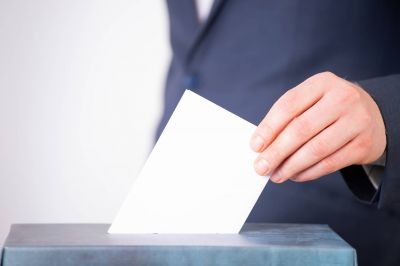
Will the "dead" vote in the Lebanese legislative elections in May? (Credit: Bigstock)
With Lebanon’s legislative elections are just around the corner, Nour,* who is in her 40s, got a double surprise when she took a look at the voter list. Her name was not on the list, which the Interior Ministry issues ahead of every election and which details the eligible voters’ names, classified by district and religion. In contrast, the name of her father-in-law, who passed away in 2016, was still there. Technically, Nour will not be able to vote in May. But her father-in-law can.
After Nour reached out to the town’s mokhtar to inquire about these errors, she learned that he had not completed the necessary formalities in order for the DGCS to issue a death certificate. The DGCS is affiliated with the Interior Ministry and is in charge with all civil status-related affairs in Lebanon.
“My husband, who is often abroad, did not follow up with the mokhtar, who simply forgot about it. This means that my father-in-law is still breathing in the eyes of the Lebanese authorities,” Nour said.
The fact that her name is not on the voter list appears to be due to an administrative slip as well. “I tied the knot a few years ago. My name was therefore removed from my parents’ family civil register. But, it has not been added to that of my husband. Hence, I can vote nowhere,” added Nour, who hopes to see this error rectified before the election date.
Handwritten registers
Unfortunately, such errors in the voter list are nothing out of the ordinary and are encountered by every Lebanese family. They are mainly due to the fact that birth or death certificates, or the Individual Civil Extract and Family Civil Extract, continue to be filled in by hand.
Who has not seen a civil servant writing on a large register, of which a few pages are sometimes taken out, to fill in a civil extract?
It was only in early 2021 that the Interior Ministry started the digitization process of a part of this civil data, limiting it to the application for Individual Civil Extract.
“Lebanon is a country that is still largely non-computerized, which makes it only fair for us to get confused. We sometimes spend hours looking for a document,” an administrative official who declined to be named told L'Orient-Le Jour.
“The start of computerization began making things a little easier for us, but it will be necessary to insert all of the citizens’ databases into computer programs to be archived.”
When it comes to the voter list, “the department heads sometimes forget to cross the deceased persons’ names [off the civil register]. Other times, the mokhtars are the ones who do not inform the authorities after someone dies, because they have a lot of work or are not well-organized,” he added.
L'Orient-Le Jour reached out to the DGCS in Beirut for comment on several occasions, but to no avail.
Georges Helou, who has been elected mokhtar of Baabda for years, revealed that some families do not even apply to obtain death certificates. “If the deceased did not leave an inheritance or if he passed away outside his hometown, the family does not start the formalities that usually take a long time and are complicated,” he explained.
“Sometimes, the DGCS is informed when someone dies, but it forgets to cross out the name of the deceased person. The error would be therefore detected when applying for Family Civil Extract or issuing the voter list,” he said.
Left the Chouf in the 60s …
Jihad,* a 35-year-old doctor, recounted a story that reflects to what extent the Lebanese administration is dysfunctional. Jihad's grandfather, who hailed from Chouf, left his home village and moved his family register to Baabda in the 1960s.
As Jihad was out of curiosity checking the voter list of his ancestral village, issued ahead of the 2009 elections, he found his father’s and his uncle’s names on the list, although the family had been gone for decades and these two people had passed away in 1992.
“We never set foot in the village, and my father and uncle passed away nearly 20 years prior to 2009. It was unbelievable!” Jihad said. The doctor noted that he did not have the time to check whether the error had been corrected in the voter list for the 2022 legislative elections, since access to this list is denied after late December.
For his part, Helou has often encountered this type of error ahead of elections. “There was a time when I saw the name of a person who was born 200 years ago and who was alive under the Ottoman Empire! From that point forward, people over 100 years old are de facto removed from the voter list,” Helou said.
He called for the authorities to computerize the sector promptly. “The problem is that some elected officials are computer illiterate,” he added.
While these slip-type mistakes are common in Lebanon, do the deceased still vote?
Aly Sleem, executive director of the Lebanese Association for Democratic Elections, said it has been a long time since such offenses were not seen. “It used to happen a lot in the ’90s, under the Syrian tutelage. There was no real oversight at the time, unlike today,” he told L'Orient-Le Jour.
Helou, who indicated having personally witnessed such fraud in the ’90s, confirmed these remarks. “I was at a polling station when a man showed up, with the ID of a dead person. I immediately notified the officials, because I knew that this person had been dead for a while,” he said.
Indelible ink as a solution
Former Interior Minister Ziad Baroud said that resorting to indelible election ink since 2008, which is applied to the voters’ fingers after they cast their ballot, has effectively ended “the dead people’s vote.”
“Although people complain about this ink, which leaves a stain that does not go immediately, this ink aims to prevent the same person from voting several times, using, for instance, the ID of a deceased [person],” Baroud told L'Orient-Le Jour.
“We conducted thorough work on the voter list in 2008,” recalled the then-minister. “Previously [prior to 2008], a private firm was tasked with reviewing the electoral list on behalf of the DGCS. After that, the DGCS took charge of this process and many errors were rectified.”
Sleem revealed that his association “did not hear of any fraud involving a deceased person in the 2009 and 2018 polls.”
“In case some are still resorting to this stratagem, they would be mere individual cases,” he said.
Rabih Haber, director of Statistics Lebanon Ltd, affirmed that fraud cases involving deceased voters are almost impossible at present.
“If a deceased person was to vote in the next elections, it would perhaps be in a remote village in southern Lebanon or the Bekaa Valley where the vast majority of the people have the same political affiliation, and where the officials at the polling stations would be colluding with the scammers,” Haber said.
It remains to be seen whether the fraudsters will come up with other tricks to escape the monitoring of the polls in May.
This article was originally published in French in L'Orient-Le Jour. Translation by Joelle El Khoury.
